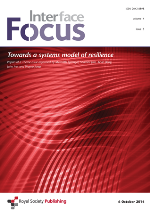Alexandria, Va. - September
05, 2014

What does it mean to be resilient in mind, body and spirit? Recovery from trauma is a concept that researchers are beginning to explore from a multidisciplinary approach. In a special issue of Interface Focus, a journal of the Royal Society, authors from several backgrounds discuss the impact of resilience from a military and civilian perspective.
The October 2014 issue of the UK-based journal Interface Focus summarizes research findings stemming from Samueli Institute’s efforts to explore resilience from a diversity of disciplines and perspectives — a first for the field. Samueli Institute’s goal was to look beyond the traditionally siloed way of studying resilience and instead look at how the whole system contributes to how individuals and societies respond and recover from traumatic experiences.
Articles collected in the special issue stem from a January 2012 meeting in which Samueli Institute convened prominent scientists in the fields of systems biology, systems engineering, mathematics, biology, psychoneuroimmunology , sociology, and medicine, along with military and civilian health care leaders to discuss and explore ideas behind a systems-based model for understanding resilience. Only by examining the concept from the perspective of multiple disciplines, can we begin to gain a firm understanding of what it means to be resilient and thus aid practitioners as they work with patients who have experienced a trauma.
“Resilience as a concept is too narrow and fails to encompass the full needs of military and civilian populations when responding to stress,” said Kevin Berry, MD, Vice President of Military Medical Research at Samueli Institute. “With this special issue, Samueli Institute has begun the work to bring a diverse group of thought leaders from many specialties together to begin to map a framework for resilience, preparedness, flexibility and adaptability on the individual and community levels."
For service members, the concept of resilience can be complicated. Staying on high alert for combat situations can lead to anxiety back in the civilian world. Coupled with physical wounds of war, service members need support as they transition from the battlefield back to life as a civilian. By examining the effects of trauma that the individual experiences and how they mentally and physically cope with these challenges will shift the focus from the single symptoms to a holistic approach to healing. A range of these topics can be explored in greater detail in the October issue of Interface Focus, now available online.
###
For more information on resilience, please visit SamueliInstitute.org.